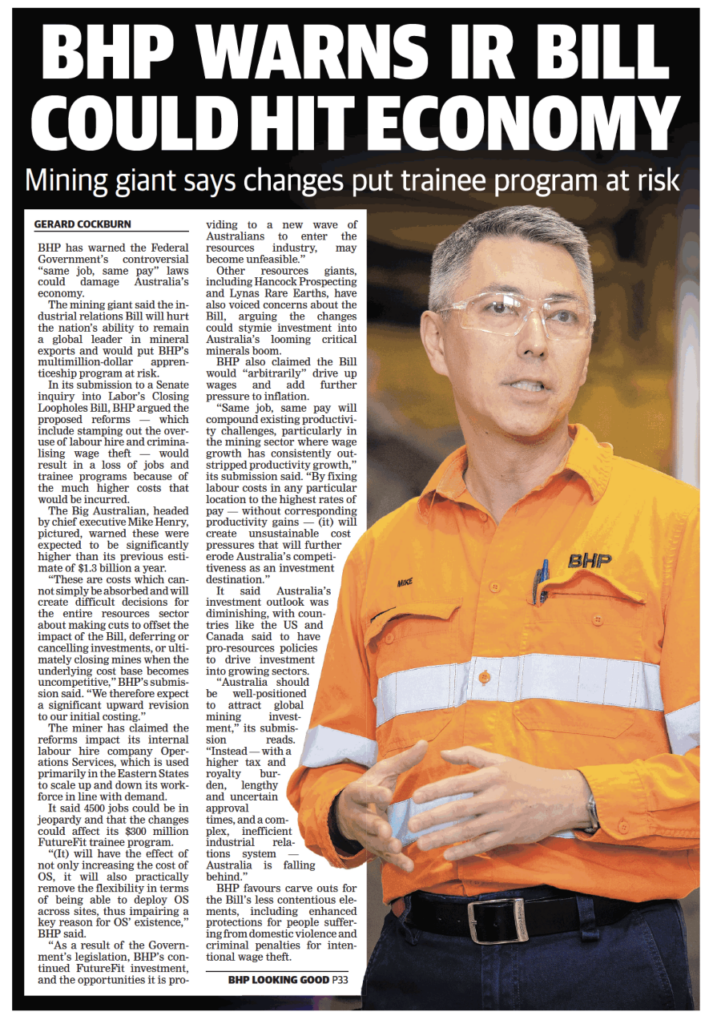
Article by Gerard Cockburn, courtesy of the West Australian.

Mining giant says changes put trainee program at risk.
BHP has warned the Federal Government’s controversial “same job, same pay” laws could damage Australia’s economy.
The mining giant said the industrial relations Bill will hurt the nation’s ability to remain a global leader in mineral exports and would put BHP’s multimillion-dollar apprenticeship program at risk.
In its submission to a Senate inquiry into Labor’s Closing Loopholes Bill, BHP argued the proposed reforms — which include stamping out the overuse of labour hire and criminalising wage theft — would result in a loss of jobs and trainee programs because of the much higher costs that would be incurred.
The Big Australian, headed by chief executive Mike Henry, pictured, warned these were expected to be significantly higher than its previous estimate of $1.3 billion a year.
“These are costs which cannot simply be absorbed and will create difficult decisions for the entire resources sector about making cuts to offset the impact of the Bill, deferring or cancelling investments, or ultimately closing mines when the underlying cost base becomes uncompetitive,” BHP’s submission said. “We therefore expect a significant upward revision to our initial costing.”
The miner has claimed the reforms impact its internal labour hire company Operations Services, which is used primarily in the Eastern States to scale up and down its workforce in line with demand.
It said 4500 jobs could be in jeopardy and that the changes could affect its $300 million FutureFit trainee program.
“(It) will have the effect of not only increasing the cost of OS, it will also practically remove the flexibility in terms of being able to deploy OS across sites, thus impairing a key reason for OS’ existence,” BHP said.
“As a result of the Government’s legislation, BHP’s continued FutureFit investment, and the opportunities it is providing to a new wave of Australians to enter the resour es industry, may become unfeasible.”
Other resources giants, including Hancock Prospecting and Lynas Rare Earths, have also voiced concerns about the Bill, arguing the changes could stymie investment into Australia’s looming critical minerals boom.
BHP also claimed the Bill would “arbitrarily” drive up wag and add further pressure to inflation.
“Same job, same pay will compound existing productivity challenges, particularly in the mining sector where wage growth has consistently outstripped productivity growth,” its submission said. “By fixing labour costs in any particular location to the highest rates of pay — without corresponding productivity gains — (it) will create unsustainable cost pressures that will further erode Australia’s competitiveness as an investment destination.”
It said Australia’s investment outlook was diminishing, with countries like the US and Canada said to have pro-resources policies to drive investment into growing sectors.
“Australia should be well-positioned to attract global mining investment,” its submission reads. “Instead — with a higher tax and royalty burden, lengthy and uncertain approval times and a complex, inefficient industrial relations system — Australia is falling behind.”
BHP favours carve outs for the Bill’s less contentious elements, including enhanced protections for people suffering fr m domestic violence and criminal penalties for intentional wage theft.